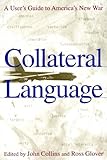Collateral Language : A User's Guide to America's New War / ed. by John Collins, Ross Glover.
Material type: TextPublisher: New York, NY : New York University Press, [2002]Copyright date: ©2002Description: 1 online resourceContent type:
TextPublisher: New York, NY : New York University Press, [2002]Copyright date: ©2002Description: 1 online resourceContent type: - 9780814723548
- English language -- United States -- Rhetoric
- Rhetoric -- Political aspects -- United States
- War on Terrorism, 2001-2009
- POLITICAL SCIENCE / Terrorism
- 151Antonia
- 911
- AGENTS
- Americas
- Bushs
- But
- CELLS
- Collateral
- EVIL
- EVILDOERS
- Guide
- Its
- Language
- Newspeak
- November
- SLEEPER
- Star
- The
- This
- Toronto
- Tyranny
- Users
- War
- Words
- Zerbsias
- almost
- appropriating
- article
- bandwagon
- been
- bodylinklightgreenfont
- book
- books
- colordarkredTHINK
- community
- complete
- considered
- could
- deconstruct
- despite
- disseminating
- double-Newspeak
- explain
- extensive
- font
- fonttahomaarialsans
- freedom
- from
- full
- fundamentalism
- graphics
- great
- have
- homeland
- intelligence
- jihad
- jump
- justice
- kind
- last
- look
- media
- mention
- most
- noInstead
- notices
- original
- perversion
- phrases
- post
- promos
- propagandistic
- publication
- publicity
- quickie
- rather
- received
- rhetoric
- search
- security
- should
- size3
- size3heroes
- size4
- sort
- stuff
- targets
- terrorism
- than
- that
- their
- there
- they
- think
- victims
- warfont
- why
- would
- youd
- zero
- 320.014
- HV6432 .C64 2002
- online - DeGruyter
| Item type | Current library | Call number | URL | Status | Notes | Barcode | |
|---|---|---|---|---|---|---|---|
 eBook
eBook
|
Biblioteca "Angelicum" Pont. Univ. S.Tommaso d'Aquino Nuvola online | online - DeGruyter (Browse shelf(Opens below)) | Online access | Not for loan (Accesso limitato) | Accesso per gli utenti autorizzati / Access for authorized users | (dgr)9780814723548 |
Frontmatter -- Contents -- Acknowledgments -- Introduction -- 1. Anthrax -- 2. Blowback -- 3. Civilization versus Barbarism -- 4. Cowardice -- 5. Evil -- 6. Freedom -- 7. Fundamentalism -- 8. Jihad -- 9. Justice -- 10. Targets -- 11. Terrorism -- 12. Unity -- 13. Vital Interests -- 14. The War on ______ -- Appendix -- Contributors
restricted access online access with authorization star
http://purl.org/coar/access_right/c_16ec
Thirteen essays contextualizing the new meanings around certain words and phrases in the post-9/11 discourseTerrorism, jihad, fundamentalism, blowback. These and other highly charged terms have saturated news broadcasts and everyday conversation since September 11th. But to keen ears their meanings change depending upon who's doing the talking. So what do these words really mean? And what are people trying to say when they use them?Each of the thirteen essays in Collateral Language offers an informed perspective on a particular word or phrase that serves as a building block in the edifice of post-World Trade Center rhetoric. In some cases this involves a systematic examination of the term in question (e.g. "anthrax" or "unity")its historical roots, the development of its meaning and usage in the U.S. over time, and its employment in the current context. In other cases authors provide a set of more philosophical or autobiographical reflections on a particular idea (e.g. "vital interests" or "evil"), suggesting a need to consider the ethical and moral implications of using the concept uncritically. In every instance, however, the overriding goal is to give the reader a set of practical tools to analyze the political language that surrounds all of us at this critical point in our nation's history. Witty, informative and highly readable, Collateral Language is a lexicon of political terminology and an indispensable tool for understanding the current conflict.
Mode of access: Internet via World Wide Web.
In English.
Description based on online resource; title from PDF title page (publisher's Web site, viewed 06. Mrz 2024)


